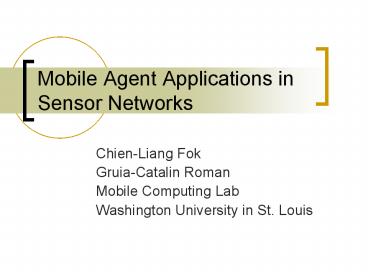Mobile Agent Applications in Sensor Networks - PowerPoint PPT Presentation
1 / 12
Title:
Mobile Agent Applications in Sensor Networks
Description:
Same memory can be used by multiple ... Mote. Fire Detection. 1. 2. 3. 4. Active Data Aggregation. s1. s2. s3. s1. s2. s3. s1. s2. s3. Active Tracking ... – PowerPoint PPT presentation
Number of Views:102
Avg rating:3.0/5.0
Title: Mobile Agent Applications in Sensor Networks
1
Mobile Agent Applications in Sensor Networks
- Chien-Liang Fok
- Gruia-Catalin Roman
- Mobile Computing Lab
- Washington University in St. Louis
2
Wireless Sensor Networks
3
Mobile Agents
Mobile Agent Mobile Code State Intelligence
- Not to be confused with
- Remote evaluation
- Code on demand
- Two types of state mobility
- Strong migrate data thread state
- Weak migrate data state only
4
Why Mobile Agents in S.N.?
- Generic network
- Reprogram a network after deployment
- Asynchronous operation
- Agents operate independently of the creator
- Memory usage
- Same memory can be used by multiple applications
(at different times) - Active networks
- Intelligent migration of code and state based on
the situation
5
Mobile Agent Middleware
- Mobile agent support should be implemented in
middleware - What features should the mobile agent middleware
provide? - Operation primitives
- Data and instruction stores (?)
- How can the middleware simplify application
development?
6
Primitive Operations
Mobile Agent
Mote
TupleSpace
Agent Lifecycle Inject(Program, Parameters,
Destination) Clone(Parameters, Destination) Move(D
estination) Expire() Agent Communication / Data
Ops. Send(Destination, Data, TimeToLive) Send(Agen
t, Data, TimeToLive)
Agent / Data Query findAgents(Region,
Attributes) findNodes(Region) findData(Region,
Attributes) grabData(Region, Attributes)
7
Fire Detection
2
1
3
4
8
Active Data Aggregation
s1
s2
s3
s1
s2
s1
s3
s2
s3
9
Active Tracking
10
Sweep-Line Search
11
Sensing Coverage
12
Research Directions
- Refinement of primitives
- Are they sufficiently expressive and powerful?
- Need a formal specification of their semantics
- Implementation
- Integration within a virtual machine (prototype)
- Evaluation of mobile agent benefits
- Agent evolution
- Split each agents code into fragments, mix up
the fragments to create new mutant agents

